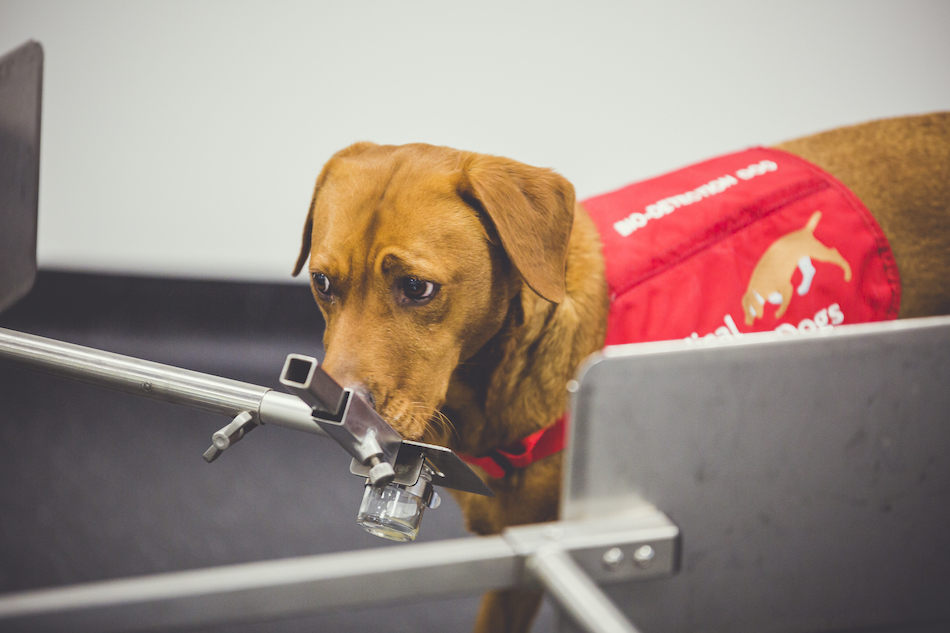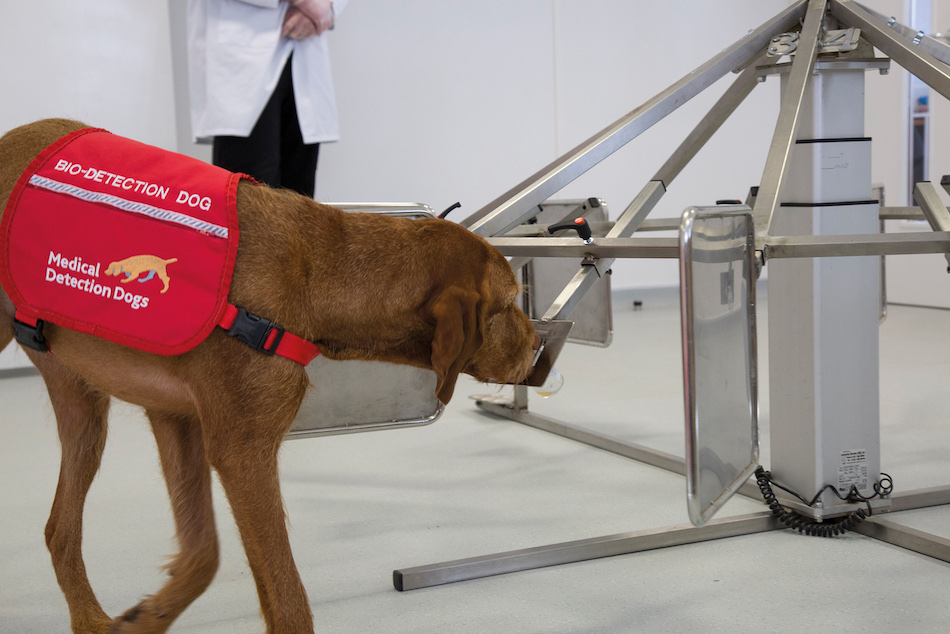Prostate cancer detection
Study proves dogs can detect most lethal prostate cancers and moves us one paw closer to E-Nose
Not only that, they can find it in urine from patients who have other diseases of the prostate.
The work of fox red Labrador, Florin and Hungarian wired-haired Vizsla, Midas, could pave the way for an urgently needed, more accurate and non-invasive method of early prostate cancer diagnosis which could support the PSA blood test. That is the test most widely used at the moment and our results are so encouraging because one of the challenges of that test is that other conditions can cause an elevated PSA but that does not necessarily mean you have cancer.

The results have been published in the highly respected journal, PLOS ONE and for the first time researchers combined three approaches – dog’s noses, artificial intelligence (AI)-assisted chemical analysis of the volatile organic compounds (VOCs) in urine samples, and microbial analysis of urine samples of men undergoing biopsy for suspected prostate cancer.
Results showed the dogs’ noses were 71% sensitive – the rate at which the dogs correctly identified positive samples and 73% specific – the rate at which the dogs correctly ignored negative samples including those with other diseases – when detecting Gleason 9 prostate cancer, the most aggressive kind. The dogs also correctly identified when 73% of patient samples did not have the disease. This compares favourably to the most commonly used prostate cancer test, the PSA blood test, and demonstrates how a new screening based on the dog’s nose could support the PSA test and improve early diagnosis, leading to better health outcomes and saving lives.
This is the first truly controlled study – both human researchers and dogs were double-blinded on which samples were from cancer patients versus otherwise healthy patients, meaning that neither dogs nor trainers knew where the positive samples were so there could be no question of bias.
The findings demonstrate that dogs can be trained to detect the most aggressive and lethal form of prostate cancer from their VOCs. Identification of the exact molecules in the odour could lead to the development of an artificial dog nose that detects prostate cancer in urine the same way biosensing machines are being used to sniff out drugs and explosives, which also have unique molecular odorant signatures.

“This additional information could support the PSA and would provide earlier, non-invasive, sensitive detection of clinically aggressive prostate cancers that would most benefit from early diagnosis, simply from a urine sample. This has enormous potential and in time the ability of the dogs’ nose could be translated to an electronic device.”
“Imagine a day when smartphones can send an alert for potentially being at risk for highly aggressive prostate cancer, years before a doctor notices a rise in PSA levels. The incredible work of these dogs is critical as we advance this program to develop an improved method of early prostate cancer diagnosis. Equally important is that men can be citizen scientists and contribute to the bio bank that will help us eventually solve this problem that is urgently needed. Once we have built the machine nose for prostate cancer, it will be completely scalable to other diseases,” added Dr. Andreas Mershin, physicist and research scientist, The Center for Bits and Atoms, Massachusetts Institute of Technology, and study co-author.
Other study contributors included: Department of Pathology and Department of Urology, James Buchanan Brady Urological Institute, The Johns Hopkins University School of Medicine, Baltimore MD; Cambridge Polymer Group, Cambridge, MA; Department of Chemistry and Biochemistry, University of Texas at El Paso, El Paso, TX; Imagination Engines, St. Charles, MO; and, Department of Psychiatry, Harvard Medical School and Massachusetts General Hospital, Boston, MA.
